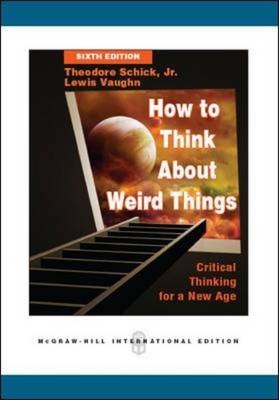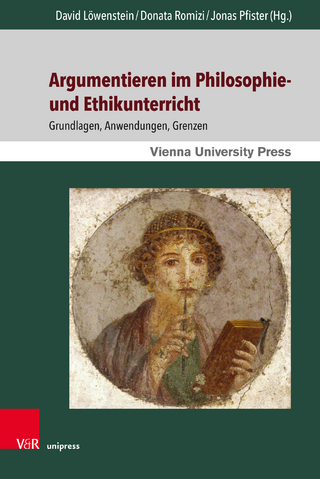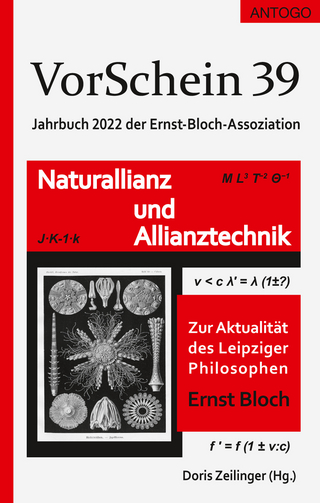
How to Think About Weird Things: Critical Thinking for a New Age
McGraw Hill Higher Education (Verlag)
978-0-07-128956-6 (ISBN)
- Titel ist leider vergriffen;
keine Neuauflage - Artikel merken
This brief, affordable text helps students to think critically, using examples from the weird claims and beliefs that abound in our culture to demonstrate the sound evaluation of any claim. It explains step-by-step how to sort through reasons, evaluate evidence, and tell when a claim (no matter how strange) is likely to be true. The emphasis is neither on debunking nor on advocating specific assertions, but on explaining principles of critical thinking that enable readers to evaluate claims for themselves. The authors focus on types of logical arguments and proofs, making How to Think about Weird Things a versatile supplement for logic, critical thinking, philosophy of science, or any other science appreciation courses.
Theodore Schick received his B.A. in philosophy from Harvard University and his Ph.D. from Brown University. He is currently professor of philosophy at Muhlenberg College where he has served as Director of Academic Computing, Director of Freshman Seminars, Director of the Muhlenberg Scholars Program, and Chair of the Philosophy Department. He is the author of Doing Philosophy: An Introduction through Thought Experiments, the editor of The Philosophy of Science: From Positivism to Post-modernism, and has published articles in several fields of philosophy including: philosophy of mind, philosophy of science, philosophy of religion, philosophy of language, meta-philosophy, epistemology, ethics, and aesthetics. He has also contributed to a number of volumes in Open Courts Philosophy and Popular Culture series as well as Blackwells Philosophy for Everyone series. Lewis Vaughn is the author of numerous textbooks in philosophy, critical thinking, and ethics, including The Power of Critical Thinking, sixth edition (2019); Concise Guide to Critical Thinking (2017); Philosophy Here and Now, third edition (2019); Living Philosophy: A Historical Introduction to Philosophical Ideas, second edition (2018); Doing Ethics: Moral Reasoning, Theory, and Contemporary Issues, fifth edition (2019); Beginning Ethics: An Introduction to Moral Philosophy (2015); Bioethics: Principles, Issues, and Cases, third edition (2017); and Writing Philosophy, Second Edition (2018).
Chapter 1. Introduction: Close Encounters with the Strange
The Importance of Why
Beyond Weird to the Absurd
A Weirdness Sampler
Notes
Chapter 2. The Possibility of the Impossible
Paradigms and the Paranormal
Logical Possibility Versus Physical Impossibility
The Possibility of ESP
Theories and Things
On Knowing the Future
Study Questions
Evaluate These Claims
Discussion Questions
Field Problem
Critical Reading and Writing
Suggested Readings
Notes
Chapter 3. Arguments Good, Bad and Weird
Claim and Arguments
Deductive Arguments
Inductive Arguments
Enumerative Induction
Analogical Induction
Hypothetical Induction (Abduction, or Inference to the Best of Explanation)
Informal Fallacies
Unacceptable Premises
Irrelevant Premises
Insufficient Premises
Study Questions
Evaluate These Claims
Discussion Questions
Field Problem
Critical Reading and Writing
Suggested Readings
Notes
Chapter 4. Knowledge, Belief, and Evidence
Babylonian Knowledge-Acquisition Techniques
Propositional Knowledge
Reasons and Evidence
Expert Opinion
Coherence and Justification
Sources of Knowledge
The Appeal to Faith
The Appeal to Intuition
The Appeal to Mystical Experience
Astrology Revisited
Study Questions
Evaluate These Claims
Discussion Questions
Field Problem
Critical Reading and Writing
Suggested Readings
Notes
Chapter 5. Looking for Truth in Personal Experience
Seeming and Being
Perceiving: True or False?
Perceptual Constancies
The Role of Expectation
Looking for Clarity in Vagueness
The Blondlot Case
"Constructing" UFOs
Remembering: Do We Revise the Past?
Judging: The Habit of Unwarranted Assumptions
Denying the Evidence
Subjective Validation
Confirmation Bias
The Availability Error
The Representativeness Heuristic
Against All Odds
The Limits of Personal Experience
Study Questions
Evaluate These Claims
Discussion Questions
Field Problem
Critical Reading and Writing
Suggested Readings
Notes
Chapter 6. Science and Its Pretenders
Science and Dogma
Science and Scientism
Scientific Methodology
Confirming and Confuting Hypotheses
Criteria of Adequacy
Testability
Fruitfulness
Scope
Simplicity
Conservatism
Creationism, Evolution, and Criteria of Adequacy
Scientific Creationism
Intelligent Design
Parapsychology
Study Questions
Evaluate These Claims
Discussion Questions
Field Problem
Critical Reading and Writing
Suggested Readings
Notes
Chapter 7. Case Studies in the Extraordinary
The Search Formula
Step 1: State the Claim
Step 2: Examine the Evidence for the Claim
Step 3: Consider Alternative Hypotheses
Step 4: Rate, According to the Criteria of Adequacy, Each Hypothesis
Homeopathy
Intercessory Prayer
UFO Abductions
Communicating with the Dead
Near-Death Experiences
Ghosts
Study Questions
Evaluate These Claims by Using the Search Method
Field Problem
Critical Reading and Writing
Suggested Readings
Notes
Chapter 8. Relativism, Truth, and Reality
We Each Create Our Own Reality
Reality Is Socially Constructed
Reality Is Constituted by Conceptual Schemes
The Relativist's Petard
Facing Reality
Study Questions
Evaluate These Claims
Discussion Questions
Field Problem
Critical Reading and Writing
Suggested Readings
Notes
Chapter 9. How to Assess a "Miracle Cure"
Personal Experience
The Variable Nature of Illness
The Placebo Effect
Overlooked Causes
The Doctor's Evidence
The Appeal to Tradition
The Reasons of Science
Medical Research
Single Studies
Conflicting Results
Studies Conflicting with Fact
Limitations of Studies
Types of Studies
In Vitro Experiments
Animal Studies
Observational Studies
Clinical Trials
Study Questions
Evaluate These Claims
Discussion Questions
Field Problem
Critical Reading and Writing
Suggested Readings
Notes
Credits
Index
| Erscheint lt. Verlag | 16.5.2010 |
|---|---|
| Zusatzinfo | Illustrations |
| Verlagsort | London |
| Sprache | englisch |
| Maße | 162 x 232 mm |
| Themenwelt | Geisteswissenschaften ► Philosophie ► Logik |
| ISBN-10 | 0-07-128956-9 / 0071289569 |
| ISBN-13 | 978-0-07-128956-6 / 9780071289566 |
| Zustand | Neuware |
| Haben Sie eine Frage zum Produkt? |
aus dem Bereich


